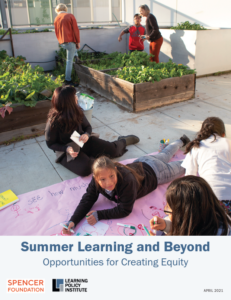Summer Learning and Beyond: Opportunities for Creating Equity
Megan Bang, Leah Bricker, Linda Darling-Hammond, Adam K. Edgerton , Pam Grossman, Kris D. Gutiérrez, Ann Ishimaru, Sarah Klevan, Carol D. Lee, David Miyashiro, Na’ilah Suad Nasir, Pedro A. Noguera, Charles Payne, Bill Penuel, Sara Plasencia , Shirin Vossoughi; Learning Policy Institute
This report synthesizes cutting-edge research on the science of learning to provide guidelines for how we can address whole child learning and avoid returning to the “old normal.” Learning environments need to be centered on strong teacher-student relationships that address students’ social and emotional learning, providing students with opportunities to construct knowledge that builds upon their experiences and social contexts in ways that deepen their academic skills. The report argues against the false dichotomy between cognitive learning and social-emotional learning that has been dominating debates around the return to school.
The report provides a set of six design principles, or stances, toward learners and learning that are essential for creating intellectually rigorous and equitable educational settings. These principles provide a holistic framework for designing goals, practices, and activities for summer learning and beyond.
The six design principles for summer learning and beyond include:
- Center relationships
- Create a culture of affirmation and belonging
- Build from students’ interests and take a whole child approach to their development
- Engage students’ and families’ knowledge in disciplinary learning
- Provide creative, inquiry-based forms of learning
- Address educator needs and learning
The report also discusses the importance of each design principle, highlights key ideas and practices that are related to each principle, and lists resources and references (hyperlinked in the text) that people can consult to learn more.
